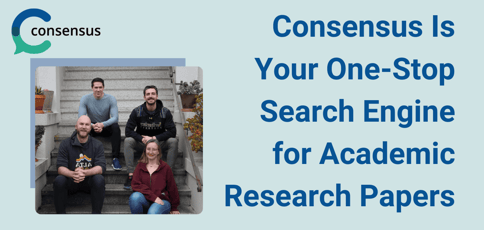
TL; DR: Raise your hand if you’ve ever had to cite an academic research article. I would wager everyone reading this has done it — which probably means you’re well aware of the effort it takes to find quality, updated, and relevant journals and academic papers. That’s where Consensus comes in: the first artificial intelligence (AI)-powered search engine for research. Christian Salem, Co-Founder and CPO of Consensus, introduced us to the tool and explained why it’s become a sought-after search engine research platform for students and industry professionals in less than a year.
I’m living my dream job: I write, kicking off each day with something new to fuel my creativity. Sometimes, I write about topics I’m already familiar with and can tap into basic information neatly stored in my head. Other times, I stumble across something entirely new, and I must dive deep into the specifics to ensure I understand the topic before portraying it to the reader.
More often than not, my day consists of research — whether for a clever hook on a specific product or an argued position that needs statistical backing. I’m not the first person to rely on the internet for research, yet I’m often faced with many search results that are difficult to narrow down and navigate past the claims posed as “facts” with no real source attached.
If this sounds like anything you’ve experienced, you’re not alone. This problem is exactly what co-founders Eric Olson and Christian Salem were struggling with and why they created Consensus. Consensus is an artificial intelligence (AI) search engine for academic papers and peer-reviewed research studies.
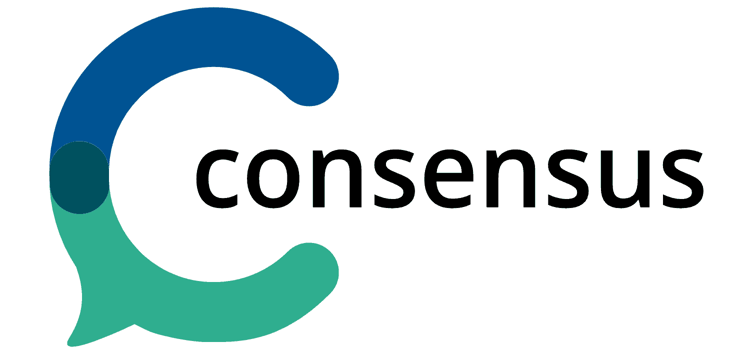
It’s easy (and free) to use. Just input your search, and Consensus fetches relevant papers based on your query and filters. It also provides a one-sentence summary that spotlights the essential points tailored to your keywords.
Of course, this tool didn’t come to fruition overnight. Christian explained that he and Eric had been exploring the concept of an AI-generated research search engine since 2016, stemming from their dissatisfaction with Google Scholar search results during their college years.
But it wasn’t until the 2020 pandemic that they decided to make the move.
“Eric and I always valued evidence-based thinking, but as outsiders, we noticed there wasn’t an easy way to access and consume research,” Christian said. “And when the pandemic hit, there was an obvious need for better tools to consume scientific information effectively, so we thought we could finally build this tool.”
Sometimes great things are born out of necessity. After all, as entrepreneur Jim Rohn said, “If you are not willing to risk the usual, you will have to settle for the ordinary.”
Meet Consensus, the AI-Powered Academic Search Engine
Consensus is a powerful AI tool that pulls relevant research papers and studies to match your query, keyword, or question.
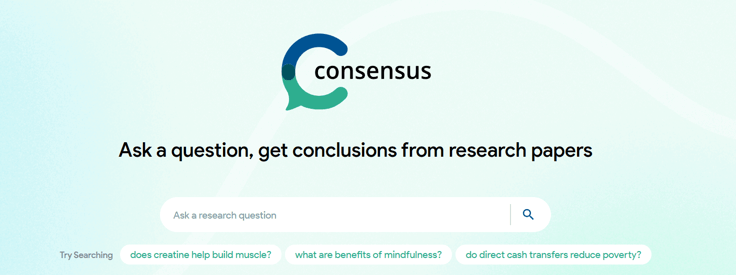
Although other tools exist, aspects of their algorithms haven’t changed in years. For example, Google Scholar uses a web crawler to identify files, but it’s not always the most reliable method amid technology advancements and user expectations.
Say I want to research “effects of blue light on children” on Google Scholar. The first result is a study called “The effects of blue light on ocular health.” That’s fine, but not exactly what I’m looking for because my emphasis is the effect on children.
I search for the same term on Consensus. Not only do I get more relevant results, but also a simple summary of the most relevant points to my query. As you can see, it mentions the effect on children:

If I’m looking for specific parameters, I can filter my results by year published, study types and characteristics, quarterly journal publication date, and domains or industries. There’s also an easy way to save, cite, and share.
“This is just one of the many ways we’re trying to help users understand the reliability and the quality of the research they see in the product,” Christian said. “We plan to continue investing there with more features that extract valuable insights from papers so users can gauge how much they can trust the source’s credibility.”
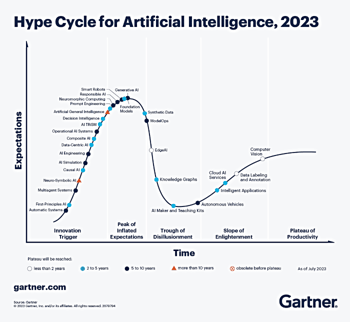
Consensus emerged when ChatGPT was reigning supreme — or, as Christian put it, “when the world became obsessed with AI products.” This led to massive organic growth almost immediately after its launch in September 2022.
“Consensus works like ChatGPT, but we’re a search engine first and foremost,” Christian noted. “The difference is we find the raw source material and then use LLMs (large-language models) to read each paper and answer the query correctly.”
The current source material used in Consensus comes from the Semantic Scholar database, which has more than 200 million papers across the domains of science. As part of its ongoing development, Consensus plans to integrate additional databases in the future. In the meantime, it adds to its dataset with regular monthly updates.
How Consensus Pulls Relevant Papers Based on Keywords
When you use a search engine, there’s only one thing you need: search relevancy. Consensus goes through a multistep process to ensure it produces only the most relevant results.
“While you can use Google to find a restaurant nearby with the right cuisine and price range, there isn’t a parallel for search relevance in academic research,” Christian explained.
After inputting your query on Consensus, a process begins behind the scenes to provide you with the most relevant results. One crucial component of this process is vector searching, a powerful machine learning (ML) type.
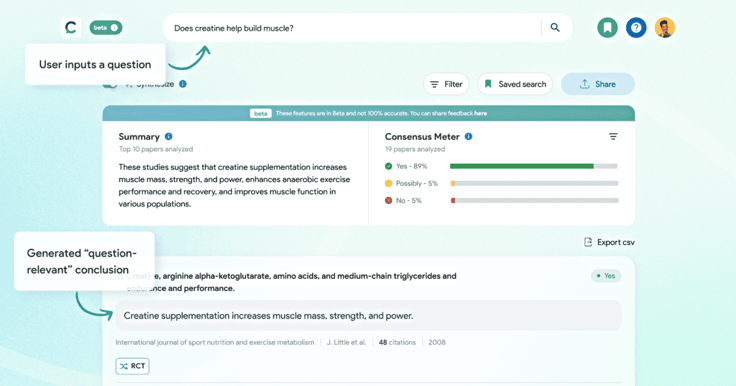
Think of vector searching as a way for Consensus to understand and capture the meaning and context of the unstructured data it handles. Consensus translates this data into a set of characteristics using vectors to make sense of the content.
For instance, a book about dogs would have coordinates including “pet,” “furry,” and “barking.” Similarly, a book about space exploration might have coordinates such as “rockets,” “planets,” and “astronauts.”
Consensus uses these vectors to find the most relevant results when you perform a keyword search (such as “high-energy visible light”). It looks for documents with coordinates close to or similar to your query. The closer the coordinates, the more contextually related the content is.
If you search with a question or phrase (such as “effects of blue light on children”), Consensus runs a custom fine-tuned LLM that generates a question-relevant conclusion based on the query keywords and paper abstract.
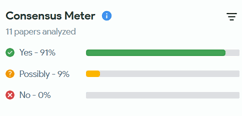
You can also use the Consensus Meter in the top right corner of the page for your synthesized results. Synthesized results are beneficial when you want a straightforward consensus. The AI provides a consensus by reading multiple papers and distilling the findings into a concise response, categorizing it as “yes,” “no,” or “possibly.”
Whether it’s research papers or journals, using Consensus is undeniably appealing. The clutter-free, user-friendly interface includes helpful search tips and features a supportive community through a help center and Slack channel.
In fact, the platform has become so popular that numerous universities have already inquired about getting Consensus licenses for their students. Christian emphasized the goal is to continue appealing to students as well as professionals, ensuring widespread accessibility and filter options for everybody.
What Lies Ahead for Consensus Amid the AI Landscape
Consensus employs AI and GPT-4 to search and refine relevant results for users, so it’s not a chatbot — but that doesn’t mean the potential isn’t on the horizon.
“We’re always going to be a search engine first,” Christian promised. “But with the popularity of chatbots, we’re looking to make our experience more flexible because that’s what users are getting used to now.”
AI-driven chatbots positively impact user experience because they provide instant gratification. And another study shows the use of conversational chatbots is increasing, often framed within the concept of “human-AI friendship.”

Given a chatbot’s popularity, Christian and the Consensus team acknowledge this generative AI technology isn’t going anywhere.
“Plenty of other parallel tools are doing slightly different things than us that are also incredible. But I think now that people have realized AI is here to stay, they will start looking for the right tool for their situations — and that’s exactly what we’re trying to build.”
You can use Consensus for free with up to 20 AI search credits per month or upgrade to the Premium plan, which provides unlimited summaries, snapshots, bookmarks, and credits. Whatever you’re searching for, see the power of Consensus yourself and try it today.



